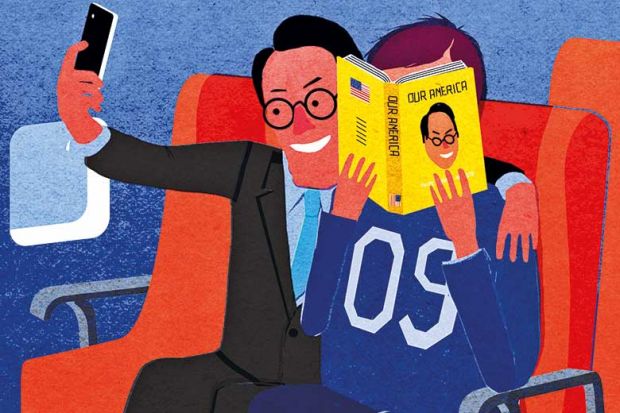It happened once before: on the Bakerloo Line. The train was strap-hangingly crowded and there was barely room to breathe, but the young man next to me managed to turn the pages of his paperback with one hand, while “holding tightly”, in obedience to the driver’s pleas, with the other.
Against my better judgement, the enforced intimacy of the setting made me ask him what he thought of the book. He looked at me searchingly and turned to the back cover. My photo besmirched the binding and, amazingly, under the blur, I was recognisable as the author.
My interlocutor, who radiated intelligence through gleaming spectacles, was German and seemed to know embarrassingly more about the book than I. Arnold Bennett, who was a genuinely popular writer, is said to have carried £100 in his pocket with the intention of presenting the sum to anyone he found reading one of his novels: the money stayed with him until the day he died. So the chances of another such encounter for me seemed comfortingly remote.
Yet it happened again the other day, as I returned home to the University of Notre Dame from distant Dallas. Our team was playing football at home – an event that draws scores of thousands of enthusiasts to our campus; so the plane was packed. The cheery fan who squeezed into the seat next to me chatted with the camaraderie that comes naturally to fellow-travellers in the kind of tiny, raucous-engined bone-rattler that airlines seem to reserve for such occasions. He told me how he had been a fan of Notre Dame football for 45 years – ever since, as an altar boy, he listened to the radio to find out whether Catholics’ favourite squad had beaten the WASPS at their own game. Never before, however, had he seen a game or visited the campus. His boyish excitement was infectious. He was a Texan whose interest in Mexican seepage across the border determined his in-flight reading.
“Do you know the Notre Dame professor who wrote this?” he asked, brandishing a title (Our America: A Hispanic History of the United States) all too familiar to me.
“Not very well,” I replied – for how many of us really know ourselves? After a brief interrogation had elicited the truth, I became, for the first and, I suspect, only time in my life, a part of someone’s selfie.
I feel a bit like the lady who, having won millions in the Texas state lottery, repeated the experience three years later, only to win a third helping of millions more a few years afterwards. Coincidence can’t happen that often, can it? I’m sure I’ll never meet another book-in-hand reader.
I suppose there was a time when Hugh Trevor-Roper or A.J.P. Taylor or Leslie Rowse might find a reader in a train or plane, but most of today’s popular historians rely on broadcasting, not books, to connect with the public.
Others operate outside history departments: think of Jared Diamond or the much lamented John Julius Norwich. There are still scientists with wide readerships, although many of them rely heavily on ghost-writers to connect with the public. University-based producers of vulgar sensationalism, “how-to” nostrums or vocational manuals exist (although they do not count as communicators of humane learning). In the European Union, high-minded academics are still sometimes celebrated as public intellectuals: that, no doubt, is one of the distasteful features of continental life that makes Brexiteers recoil. Public intellectuals begin at Calais.
Most of my books, like most academics’, are never going to earn the cost of printing the bleak, blank royalty statement. I do not repine, because my only target audience is myself: at least I’m guaranteed a critical readership. And if I can enhance my own understanding of a subject, I’ve achieved enough to justify the time spent writing. If I get no other readers, the loss to the world is slight.
Nevertheless, I worry about the chasm that gapes, with increasingly wide-mouthed bafflement, between professorate and populace: the only justification for the existence of a well-remunerated leisure class is the public benefit of widely shared erudition. If we have something worth saying, it should reach everyone who might be interested. Academics who hide their work behind hierophantic language, esoteric obstacles, arcane codes and other hostile firewalls are guilty of trahison des clercs.
All the usual suspects share the blame: academic introspection that fixates each contributor to the Journal of Ergonomic Hermeneutics or suchlike on a handful of fellow-readers; indifference to the economy and euphony that make books accessible; the way the internet divides the world into cyber-ghettoes of the like-minded, who have no interest in breadth of mind or diversity of opinion; the cult of the specialist, which condemns researchers to dig ever deeper furrows in ever drier soils until they are buried under their own aridity.
I worry, however, less about the causes than the consequences of the isolation of academics in traditional disciplines. The world still takes an interest in professors who belong in vocational training or in supposedly useful “thinktanks”. But workers in humane subjects or scientific arcana or what used to be called higher learning have ever fewer readers and ever less to say to them. We should not be surprised at the next phases: after running out of readers, we may run out of students, prospects and funds.
Felipe Fernández-Armesto is William P. Reynolds professor of history at the University of Notre Dame.
Register to continue
Why register?
- Registration is free and only takes a moment
- Once registered, you can read 3 articles a month
- Sign up for our newsletter
Subscribe
Or subscribe for unlimited access to:
- Unlimited access to news, views, insights & reviews
- Digital editions
- Digital access to THE’s university and college rankings analysis
Already registered or a current subscriber?





